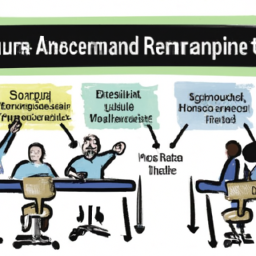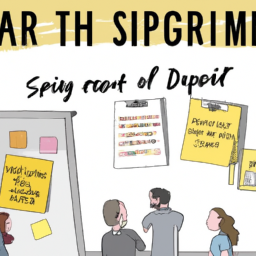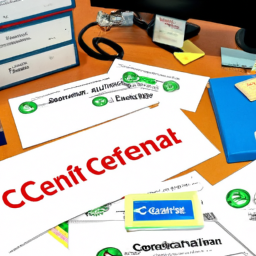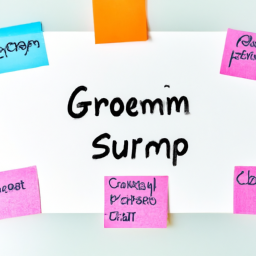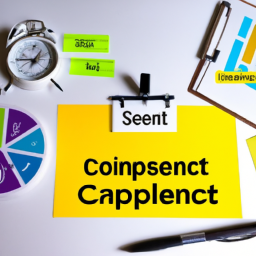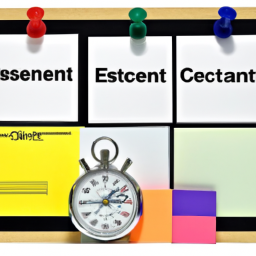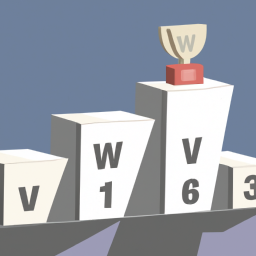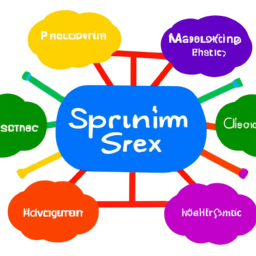Are you ready to crack the code and gain insider insights on the SCRUM exam? Look no further!
In this article, we’ve got you covered with essential study resources, effective techniques, key concepts, and terminologies.
With our tips for exam success, you’ll be well-prepared to conquer the SCRUM exam.
So, let’s dive in and unlock the secrets to acing this exam!
Key Takeaways
- It is important to manage time effectively during the SCRUM exam
- Read through all questions first and allocate time accordingly
- Recommended study resources include books such as ‘Scrum: The Art of Doing Twice the Work in Half the Time’ and ‘The Scrum Field Guide: Agile Advice for Your First Year and Beyond’
- Active learning, effective time management, and understanding key concepts and terminologies are essential for exam success
Exam Structure and Format
The Scrum exam’s structure and format are designed to test your understanding of the methodology. It is crucial to manage your time effectively during the exam to ensure that you answer all the questions within the given timeframe.
One of the most common mistakes candidates make is spending too much time on a single question, which can lead to running out of time before completing the entire exam. To avoid this, it is important to read through all the questions first and allocate time for each one accordingly.
Additionally, carefully reviewing the exam instructions and understanding the marking scheme can help you prioritize your answers and maximize your score.
Now that we have discussed the exam structure and format, let’s move on to essential study resources that will aid in your preparation.
Essential Study Resources
Make sure you have all the essential study resources for acing the exam. When preparing for the scrum exam, it is important to have the right tools at your disposal. Here are two key resources that can greatly enhance your chances of success:
- Recommended Books: The following books come highly recommended for studying scrum and preparing for the exam:
| Book Title | Author |
|---|---|
| "Scrum: The Art of Doing Twice the Work in Half the Time" | Jeff Sutherland |
| "The Scrum Field Guide: Agile Advice for Your First Year and Beyond" | Mitch Lacey |
| "Agile Estimating and Planning" | Mike Cohn |
These books provide comprehensive insights into scrum principles, practices, and techniques, and will help you develop a deep understanding of the subject matter.
- Online Practice Quizzes: To assess your knowledge and familiarize yourself with the exam format, it is crucial to take online practice quizzes. Websites like Scrum.org offer practice exams that simulate the real test environment. These quizzes will help you identify areas where you need to improve and reinforce your understanding of scrum concepts.
Effective Study Techniques
Utilize effective study techniques to maximize your preparation for the scrum exam.
Active learning is essential in this process. Instead of passively reading through study materials, actively engage with the content by taking notes, summarizing key concepts, and discussing with fellow learners. This will enhance your understanding and retention of the material.
Additionally, effective time management is crucial. Create a study schedule that allows for regular, focused study sessions. Break down the material into manageable chunks and allocate specific time for each topic. This will help you stay organized and ensure that you cover all the necessary material before the exam.
Key Concepts and Terminologies
To fully grasp the key concepts and terminologies in Scrum, you should actively engage with the content by taking notes, summarizing key points, and discussing with fellow learners. Understanding the Scrum artifacts and their significance is crucial in implementing Scrum effectively.
The three main artifacts in Scrum are the Product Backlog, Sprint Backlog, and Increment. The Product Backlog is a prioritized list of all the work that needs to be done, while the Sprint Backlog contains the tasks chosen for a specific sprint. The Increment is the sum of all the completed work at the end of a sprint.
Additionally, understanding the roles and responsibilities in Scrum teams is essential. The Scrum Master facilitates the team, the Product Owner represents the stakeholders, and the Development Team is responsible for delivering the product.
Tips for Exam Success
Studying effectively and seeking guidance from experienced professionals can greatly enhance your chances of success in the Scrum exam.
To maximize your preparation, it is important to create a study schedule that allows for consistent and focused learning. Break down the topics into manageable chunks and allocate specific time slots for each. This will help you cover all the necessary material without feeling overwhelmed.
Additionally, incorporating test-taking strategies into your study routine can significantly improve your performance. Practice with sample questions and simulate exam conditions to develop your time management skills and familiarize yourself with the format of the exam.
Furthermore, make use of mnemonic devices, visualization techniques, and other memory aids to retain and recall information effectively.
Frequently Asked Questions
How Many Questions Are There in the SCRUM Exam?
The SCRUM exam consists of a specific number of questions that you need to answer. The exam structure is designed to test your knowledge and understanding of SCRUM principles and practices.
It is important to note that the number of questions in the exam may vary, depending on the specific certification level you are pursuing. The difficulty of the exam also varies, with questions ranging from fundamental concepts to more complex scenarios.
Being well-prepared and familiar with the SCRUM framework will greatly increase your chances of success.
Is There a Time Limit for Completing the SCRUM Exam?
Yes, there is a time limit for completing the SCRUM exam. Time management is crucial when it comes to exam preparation.
It is important to allocate enough time for studying and understanding the material before the exam. By practicing time management skills, you can effectively pace yourself during the exam and ensure that you are able to complete all the questions within the given time frame.
Can I Use Any Reference Materials or Resources During the Exam?
During the SCRUM exam, you’re not allowed to use any reference materials or resources. It’s important to rely on your knowledge and understanding of SCRUM principles and practices.
To prepare for the exam, make sure you study the SCRUM Guide thoroughly and understand key concepts such as the roles, artifacts, and ceremonies.
Additionally, practicing sample exam questions and scenarios can help you familiarize yourself with the format and improve your chances of success.
What Is the Passing Score for the SCRUM Exam?
When it comes to the scrum exam passing score, it’s important to be well-prepared. While the specific passing score may vary, it’s generally recommended to aim for at least 85%.
To increase your chances of success, focus on understanding the scrum framework, its principles, and practices. Practice mock exams, review study materials, and seek guidance from experienced scrum practitioners.
Can I Retake the SCRUM Exam if I Fail It the First Time?
Yes, you can retake the SCRUM exam if you fail it the first time. However, there are consequences for failing the exam.
You will need to wait for a certain period of time before you can retake it, and you may be required to pay a fee for each retake.
It is important to thoroughly prepare for the exam to increase your chances of passing and avoid the need for retaking.
Conclusion
In conclusion, you have delved into the depths of Scrum exam preparation, unlocking insider insights and acquiring the necessary knowledge to crack the code of success.
Armed with essential study resources and employing effective study techniques, you have grasped key concepts and terminologies with precision.
Remember, practice makes perfect, so keep persevering and polishing your skills.
With these tips for exam success, you are ready to conquer the Scrum exam and embark on a journey of professional growth and accomplishment.
Go forth and flourish!



